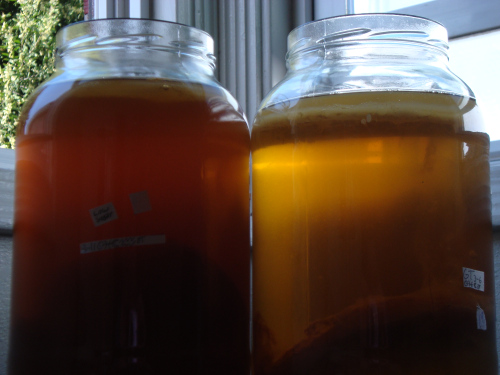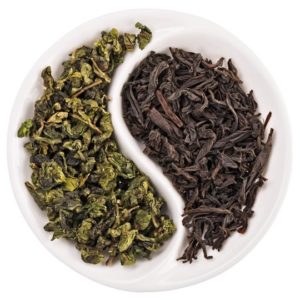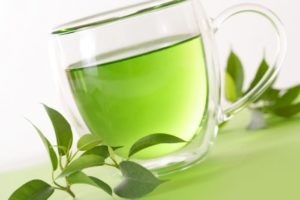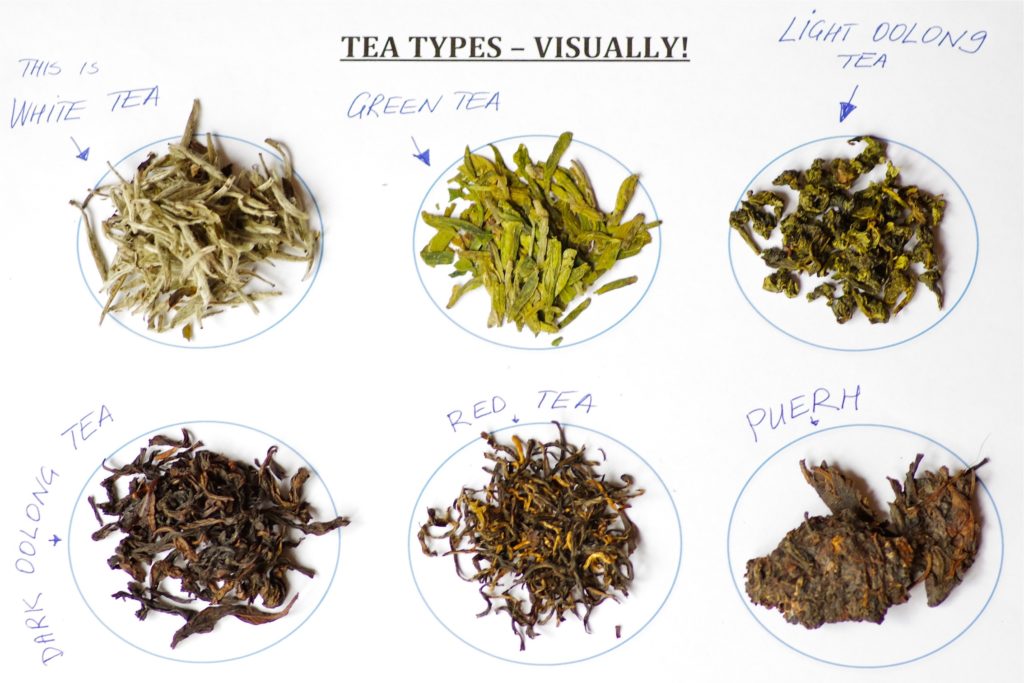Green Tea vs Black Tea for Kombucha
Kombucha is usually recommended to be brewed from either black tea, green tea, white tea, oolong tea, or yellow tea. The common factor between these teas is that they all derive from the Eastern tea plant, Camellia Sinensis. Leaves from the Camellia Sinensis plant are harvested and dried, either straight away, or undergo processes such as fermentation, roasting or curing. Which process the leaves are put through determines which type of tea is made.
The kombucha SCOBY culture has adapted itself over thousands of years to feed off of the nutrients available from the leaves of the Camellia Sinensis plant. That is why it is highly recommended for ensured SCOBY health that one uses one of the teas which derive from Camellia Sinensis. Other than incorrect types of nutrients, other herbal teas can also contain potentially hazardous (to the SCOBY that is) elements, such as naturals oils which can interfere with the SCOBY’s ability to absorb oxygen, or antibacterial properties which can harm the bacteria component of the SCOBY.
Most Popular Tea Types for Kombucha: Black & Green Tea
Most probably due to common knowledge of, availability and price, it seems that black tea and green tea are the two most widely used teas for kombucha making. Having said that, there are vastly varying reports of which variety produces a better and healthier SCOBY.
As there are a lot of different factors which could be involved in which tea type a person is using, whether it is organically grown and free of pesticides and other chemicals, what your SCOBY is used to etc, and such an array of different testimonials, it is tricky to establish which one of the two is better for the SCOBY.
Black tea is probably used a lot more for kombucha making then green tea, but besides promoting vigorous SCOBY formation and good fermentations, this could also be due to it being generally a more commonly stocked item in western kitchens, or cheaper.
Since SCOBYs are living organisms they tend to adapt to the conditions and tea type which they are in. Therefore if a SCOBY culture has adapted itself to black tea, then it might undergo a slow down or reduction in overall heath when placed in green tea – or one of the other tea types – and vice versa if it has adapted itself to green tea. In keeping with this belief, and the assumption that black tea is more commonly used for kombucha brewing than green tea, then it stands to reason that the more popular consensus is that black tea is a better promoter of SCOBY health.
Black Tea Kombucha Characteristics
Black tea is successfully used to brew kombucha tea the world over. It is cheap and readily available. It is likely that the SCOBY which you started brewing with is most probably adapted to black tea, and therefore might do better in it. However, that is not a guarantee, as each SCOBY and situation is different.
SCOBY Health in Black Tea
Many kombucha brewers are of the opinion that black tea is the best for ultimate SCOBY health and fermentation ability. To verify for certain for yourself, you would have to experiment and see what results you get from green versus black tea. But if you are using black tea, your SCOBY is doing fine (if you are not sure what a healthy SCOBY looks like you can check out What Does A Healthy Kombucha SCOBY Look Like?) and have no desire to change, don’t – black tea is 100% good to brew with, possibly the best.
Though not a sign of ill health, black tea does cause brown staining within the SCOBY. This is in no way an indication of an unhealthy SCOBY culture, but if you are wanting to use SCOBYs in cooking, such as stir fries etc, then you might prefer the whiter ones produced by green tea fermentations. For more ideas on how one can use SCOBYs in the kitchen, have a look at What To Do With Extra SCOBYs.
Health Benefits of Black Tea
While it seems that the general idea that most people have with regards to green tea and black tea is that green tea is good for you, contains miraculous health benefits, and that black tea is bad for you, research says otherwise. According to studies, both contain healthful properties. In equal measure, both green tea and black tea can also contain harmful substances or chemicals, introduced in the growing and manufacturing process. The established health benefits of black tea are said to be as follows:
- improves circulation and blood pressure
- helps regulate digestion and treat diarrhoea
- helps prevent tooth decay
- is a source of antioxidants
- assists to prevents high cholesterol
- aids in the prevention of breast cancer
- promotes bone health
- plays a role in the prevention of diabetes
See the following studies
Long-term tea intake is associated with reduced prevalence of (type 2) diabetes mellitus among elderly people from Mediterranean islands: MEDIS epidemiological study: http://www.ncbi.nlm.nih.gov/pubmed/19259345
Green and black tea consumption and risk of stroke: a meta-analysis: http://www.ncbi.nlm.nih.gov/pubmed/19228856
The Taste of Black Tea Kombucha
Unflavoured kombucha made with black tea usually has a stronger taste than that made with the other teas derived from Camellia Sinensis plant, as it is the most oxidized.
Green Tea Kombucha Characteristics
Even if not as prevalent as black tea, green tea is widely used for kombucha brewing, considered by some to be superior for the SCOBY. Others prefer the flavor it gives, while finding that they need to periodically give their SCOBY black tea to keep it healthy, as it seems to need the nutrients contained within the black tea leaves.
SCOBY Health in Green Tea
As outlined above, whether green tea is better for the kombucha SCOBY or worse for the kombucha SCOBY seems to be a variable thing. In general, it seems that the larger balance of people making kombucha have experienced that black tea works better for their SCOBY than green for keeping it growing and producing optimum fermentation, but this appears to be something particular to what the SCOBY in question is used to, and cannot be covered by a blanket rule.
However, what is consistent is that the SCOBY culture remains a pretty white creamy colour when green tea is used for kombucha making. This is because there are no tannins present to stain it. So if you take great pleasure in having as white as possible a SCOBY – or even require these in particular for cooking with – then green tea brewing would be the way to go providing that your SCOBY can handle it.
Fact: Jun Tea, a close cousin to Kombucha, brews only in Green Tea, unlike Kombucha which can brew easily brewed in many different types of teas.
Health Benefits of Green Tea
Although, as with black tea, Green tea has been drunk for thousands of years, it has now found its place in the media limelight as an effective health tonic. While it is widely known that it can be good for keeping the skin youthful, and aid in weight loss, green tea has other health benefits too.
- contains high levels of antioxidants
- helps lower cholesterol
- boosts the immune system
- promotes healthy skin
- boosts the metabolism which can aid in weight loss
- aids in normalizing high blood pressure
- slows tooth decay due to antibacterial properties
- assists in brain functions
- promotes a healthy heart
The Taste of Green Tea Kombucha
Green tea gives a more ‘grassy’ or earthy flavor to batches of kombucha. The taste is of course all a matter of personal preference, so you would have to try it to see if it is nice. However green tea makes a perfectly acceptable tasting kombucha tea, some people much prefer it. The effect tends to be a lighter fresher taste and more effervescent quality.
Changing From One Tea Type To Another
If you have been brewing with black tea and want to see what results you get from brewing with green tea, or vice versa, it is perfectly safe to switch for your new batch and see how you like the finished ferment. However, if for whatever reason you want to change the tea you use completely (remember it must be one from the Camellia Sinensis plant) then it might be a good idea to do so in degrees.
As it appears that SCOBY cultures adapt to their environments and start to function to the best of their ability in the circumstances which they are usually in, there is a common belief that if you want to change to another one of the tea types, and experience continued SCOBY health, one can do it bit by bit, by using a combination of the two teas, and slowly bring the concentration over to the one you want to switch to. 10% by 10% change over per each new brew is one of the used ratios.
However, if you merely wish to have some variation, you can always change teas for a few brews, and then put your SCOBY back into a batch of sweat black (or if your usual choice is green, then green) tea to regain its strength from the nutrients it is used to.
Mixing Different Tea Blends
Kombucha takes very well to experimentation. Indeed, you can get some of the best flavor profiles if you experiment with using some different tea blends as your kombucha tea base. The subtle flavors can completely change how your end kombucha brew tastes and even impact the second fermentation taste.
We often talk about the power of mixing in various spices, herbs, and fruits during the Second Ferment to increase the flavor profile of your Kombucha. But also just as powerful, though much more subtle, is to experiment with different tea types for the base tea mix — using high quality exotic teas as the tea base or blending in black and green teas with other exotic tea types.
You Can Mix Green & Black Teas Together
One strategy some Kombucha brewers utilize to take advantage of BOTH tea types is to blend both Black and Green tea for your Kombucha. Your SCOBY will do perfectly well with such a blend and there will be subtle flavor changes.
You Can Mix Green and Black Teas with Other Tea Types
Indeed, you can extend the tea blending to include other types of teas. For example:
- Black Tea + Oolong Tea blend
- Black Tea + White Tea blend
- Green Tea + White Tea blend
- Green Tea + Oolong Tea
- Black Tea + Puri tea
These are just SOME combinations. You can certainly come up with more! Usually when it comes to blend, most brewers use either a Black tea or Green tea base with another type of tea. The reason is because the SCOBY tends to do ‘best’ in black or green tea (some brewers will tell you SCOBYs do best in Black tea). By blending in one of these teas, you are ensuring your SCOBY will stay healthy, even if you mix in a different, exotic tea in the brew that the SCOBY may not take to as well if it was ONLY brewed with that tea.
Final Word on Green Tea vs Black Tea for Kombucha
It is possible to make good kombucha with all of the Camellia Sinensis tea varieties. It you want to know more about what results to expect from the other teas’ in this family, you can also read What is the Best Tea For Brewing Kombucha. As all SCOBYs and situations are unique, which tea is best for kombucha brewing is a matter of preference and circumstance.
The best information is that which is acquired first hand, so experiment and see what tea is best for you and your SCOBY!








